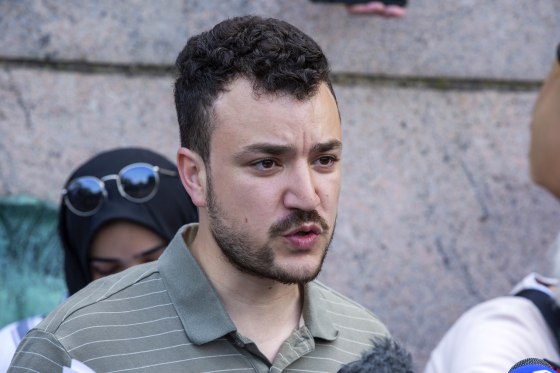An immigration judge in Louisiana ordered the federal government Tuesday to provide evidence by Wednesday justifying its attempt to deport a Columbia University student activist.
At a hearing, Judge Jamee Comans gave the federal government 24 hours to turn over its evidence against Mahmoud Khalil, a permanent U.S. resident and prominent pro-Palestinian activist, said Marc Van Der Hout, one of Khalil's attorneys, who attended the hearing.
"The government has not produced a single shred of evidence to date to support any of its allegations or charges in this case including its outrageous position that Mahmoud’s mere presence and activities in this country have potentially serious adverse foreign policy consequences," Van Der Hout said.
The Justice Department did not immediately respond to a request for comment.
Khalil, 30, who holds a green card granting him permanent residency in the United States, was arrested outside his university-owned apartment in New York City in March and moved to a detention center in Louisiana.
The Trump administration has cited a rarely used provision in immigration law that allows the secretary of state to deport someone if it is determined that the person “would have serious adverse foreign policy consequences for the United States.”
The government has also alleged that Khalil withheld information about his membership in certain organizations and failed to disclose his employment at the Syria Office in the British Embassy in Beirut in his permanent residency application.
A lawyer for Khalil said the government's claims "primarily show that the government must know the supposed ‘foreign policy’ grounds for Mahmoud’s removal are absurd and unconstitutional."
The Department of Homeland Security has said Khalil “led activities aligned to Hamas, a designated terrorist organization," but an attorney for Khalil has said there is no evidence he has provided any kind of support to a terrorist organization.
White House press secretary Karoline Leavitt has claimed that Khalil "organized group protests that not only disrupted college campus classes and harassed Jewish American students and made them feel unsafe on their own college campus" and "distributed pro-Hamas propaganda, fliers with the logo of Hamas."
Khalil is not publicly known to face any criminal charges.
Comans, the immigration judge, scheduled a hearing for Friday, when she will decide whether Khalil can be removed from the United States or order him released. If he is deemed deportable, Khalil's legal team could apply for relief from removal.
Van Der Hout, one of his attorneys, said Comans' intention to rule later this week provides "no realistic opportunity for Mahmoud and his lawyers to contest this baseless charge."
"If this turns out to be what happens Friday, it would be an uncalled-for rush to judgment that would completely deprive Mahmoud of any due process, which is a foundation of our legal system," Van Der Hout said.
Khalil and his wife, a U.S. citizen, are awaiting the birth of their first child this month. Earlier Tuesday, his wife, Noor Abdalla, wrote Khalil a letter.
“I miss you more and more everyday," she wrote, "and as the days draw us closer to the arrival of our child, I am haunted by the uncertainty that looms over me—the possibility that you might not be there for this monumental moment."

